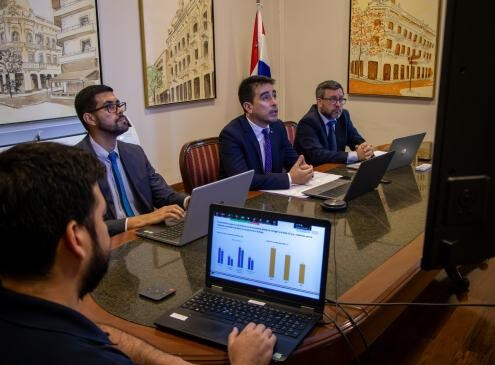
Asunción, Paraguay – Paraguay's central government accumulated a fiscal deficit equivalent to 2.7% of its Gross Domestic Product (GDP) by the end of April 2025, according to the latest Central Government Fiscal Situation Report (Situfin) released yesterday by the Ministry of Economy and Finance (MEF). This figure comes despite the government recording a surplus of 0.24% of GDP in April, a positive shift after three consecutive months of deficits. However, this single month of positive balance was insufficient to reverse the overall trend of a widening fiscal gap.
The Situfin report detailed that the cumulative fiscal deficit up to April reached 1.965 trillion Guaraníes (-0.5% of GDP), which translates to approximately $248.8 million USD. While the annual fiscal deficit ratio saw a slight decrease from the 2.8% recorded in March, the report indicates that pressure on government finances remains significant. A key contributing factor to this pressure is the marked increase in current expenditures. Total government spending has risen by 7.5% year-to-date, with current expenditures surging by 12.9%. This increase is largely attributed to higher outlays on social programs, including the purchase of pharmaceuticals and school meals.
A particularly sensitive and substantial component of the central government's expenditure is personnel costs. The report reveals that a staggering 54.1% of tax revenue is currently allocated to the payment of public sector salaries, primarily concentrated in the health, education, and security sectors. This high proportion of personnel expenditure places a considerable strain on the government's fiscal management and necessitates urgent improvements to ensure long-term fiscal health.
In a more positive development, public investment showed signs of recovery, reaching 2.073 trillion Guaraníes ($261.5 million USD), or 0.6% of GDP. This represents a modest increase of 0.2 percentage points compared to the same period in 2024. While the uptick in public investment is a potentially encouraging sign for long-term economic growth, its overall share in total fiscal expenditure remains relatively low.
The findings of the Situfin report have elicited cautious analysis and expressions of concern from economic experts. While the temporary surplus recorded in April offers a glimmer of hope, the substantial accumulated deficit and the high growth rate of current expenditures underscore the vulnerability of the government's fiscal position. The fact that over half of tax revenues are consumed by personnel costs is particularly worrisome, as it limits the government's flexibility in fiscal management and could constrain investment in areas crucial for economic development.
Some economists acknowledge that increased spending on social programs and the strengthening of public services may be necessary. However, they emphasize the critical need for the government to simultaneously enhance spending efficiency and reduce unnecessary waste. Furthermore, experts advise that achieving long-term fiscal sustainability requires broadening the tax base and implementing policies that foster greater economic growth potential.
The Paraguayan government is expected to respond to the Situfin report's findings by exploring a range of measures aimed at ensuring fiscal consolidation. Key priorities are likely to include structural reforms to improve the efficiency of current expenditures, a review of policies to expand the tax base, and efforts to stimulate economic activity through increased public investment in strategic sectors.
In conclusion, the fiscal deficit situation up to April 2025 presents a significant challenge for Paraguay's government finances. Addressing this issue will require a proactive and multifaceted policy response. It is crucial for the government to prioritize long-term fiscal health by implementing structural reforms and striking a balance between fiscal stability and economic growth initiatives, rather than relying on short-term fixes. The coming months will be critical in determining the trajectory of Paraguay's fiscal management and its impact on the nation's economic future.
[Copyright (c) Global Economic Times. All Rights Reserved.]






























